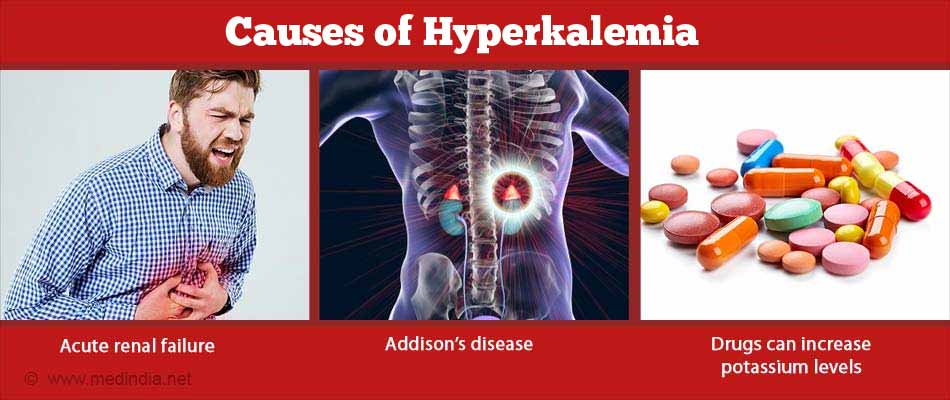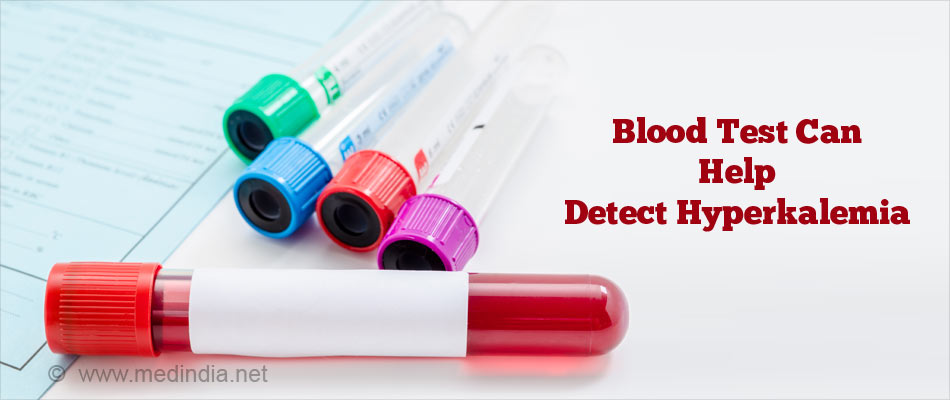- Hyperkalemia - (https://www.aafp.org/afp/2006/0115/p283.html)
What is Hyperkalemia?
Hyperkalemia is an abnormally high level of potassium in the blood. The normal level of serum potassium (potassium in the fluid portion of the blood) is 3.5 to 5.0 mmol/l. When serum potassium is above 5.5 mmol/l, it is called as hyperkalemia.
Potassium is an essential electrolyte in the body. Potassium is present in both intracellular and extracellular space. The major portion of body potassium is found in the cells of various tissues. The rest of about 2% of potassium is circulating in the blood. It is responsible for the maintenance of water balance and acid-base balance in the body. It is essential for the transmission of the electrical impulses in the nerve and muscle. It has an important role in maintaining a normal blood pressure.
The level of potassium in the body is regulated by the kidneys. In hyperkalemia, they excrete more amount of potassium to maintain a normal level.
What are the Causes of Hyperkalemia?
Kidneys are important to maintain the normal potassium levels. Hence kidney disease or decrease in the blood flow through the kidneys can cause hyperkalemia. The causes of hyperkalemia are :
Conditions that can Induce Hyperkalemia
- Acute renal failure: Kidneys are important in maintaining the potassium by regulating the excretion of potassium. In acute renal failure due to decreased renal function, the excretion of potassium is decreased and hence leads to hyperkalemia.
- Chronic kidney disease: Since kidneys help in excreting potassium, kidney diseases can cause decreased kidney function and decreased excretion of potassium leading to hyperkalemia.
- Addison’s disease: Adrenal gland releases aldosterone which helps to retain water and sodium in the body and excrete potassium. A decrease in the aldosterone release in Addison’s Disease causes retention of potassium leading to hyperkalemia.
- Type 1 diabetes: Diabetes mellitus type 1 is due to decreased production of insulin by the pancreas. Hyperkalemia is seen in diabetics.
- Dehydration: Loss of body fluid is called dehydration. It can lead to hyperkalemia or hypokalemia (low potassium in blood).
- Muscle injury or tissue injury as in burns: Injury to the muscle or tissue leads to cellular injury and thus leads to leaking of the potassium from cells to extracellular space. Thus it leads to hyperkalemia.
- Excess potassium intake: Excess consumption or administration of potassium can lead to hyperkalemia, especially in patients with kidney diseases.

Drugs That can Induce Hyperkalemia
Certain drugs can induce hyperkalemia in patients and they are
- Angiotensin-converting enzyme inhibitors: These drugs are used in patients with hypertension, diabetic nephropathy and heart attack. ACE inhibitors prevent the conversion of angiotensin I to angiotensin II. Since there is a decrease in the angiotensin II, there is a decrease in the levels of aldosterone which helps in the excretion of potassium. This in turn leads to hyperkalemia. Ramipril, lisinopril, captopril, enalapril. etc are ACE inhibitors.
- Angiotensin receptor blockers (ARBs): These are used in hypertension. A decrease in the action of angiotensin leads to a decrease in the aldosterone and hence leads to hyperkalemia. Losartan, telmisartan. etc are ARBs.
- Potassium-sparing diuretics: Diuretic drugs excrete excess body fluids. Potassium-sparing diuretics, unlike other diuretics, spare potassium from excretion. They are useful in patients with heart failure and hypertension in addition to other drugs. Spironolactone, amiloride etc are potassium-sparing diuretics.
- Non-steroidal anti-inflammatory drugs (NSAIDS): They are used to alleviate the pain. They act by inhibiting the synthesis of prostaglandins, which have an essential role in the functioning of kidney thus leading to hyperkalemia.
- Beta blockers: These are the drugs which block beta sympathetic receptors. They are used in patients with hypertension, hyperthyroidism, angina, arrhythmias, migraine etc. Beta blockers include propranolol, metoprolol, timolol, sotalol, etc. They are associated with hyperkalemia.
What are the Signs and Symptoms of Hyperkalemia?
The signs and symptoms of hyperkalemia are:
- Nausea and vomiting
- Malaise
- Muscle paralysis or weakness
- Breathlessness
- Irregular heart rhythm or arrhythmia
- Chest pain
How do you Diagnose Hyperkalemia?
The diagnosis of hyperkalemia is based on the following:
- A thorough history of the patient can give a clue to find the cause of hyperkalemia.
- Blood test: Blood levels of potassium are normally between 3.5 to 5.0 mmol/l and when it is above 5.5 mmol/l, it is hyperkalemia.

- Electrocardiogram (ECG): ECG helps to find any rhythm disturbances due to hyperkalemia.
- Kidney function test: Blood urea and creatinine help to find the functional status of the kidney. A serious kidney problem can be a cause behind hyperkalemia, hence it is important to assess for kidney function.
How do you Treat Hyperkalemia?
Treatment of hyperkalemia includes the following:
Calcium gluconate: In patients with arrhythmias due to hyperkalemia, treatment should be quick. Calcium antagonizes the effect of potassium on the cell membrane and also it works within 1-3 minutes, hence it should be given in patients with arrhythmias due to hyperkalemia.
Temporary measures to lower the potassium: It is achieved by pumping in the potassium into the cells. This can be achieved by:
- Insulin: IV drip of insulin with dextrose helps to drive the potassium into the cells.
- Salbutamol: Nebulization with 10-20mg of salbutamol helps to lower the potassium by driving them into the cells.
Removal of excess potassium from the body: This can be achieved by -
- Hemodialysis or hemofiltration: Hemodialysis are rapid methods to remove excess potassium from the body.
- Loop diuretics: They cause excretion of potassium through urine.
How do you Prevent Hyperkalemia?
To prevent hyperkalemia it is necessary to:
- Monitor the kidney problems
- Reduce the potassium intake
- Remove the drugs which cause hyperkalemia
- Addition of loop diuretics in patients with constantly high potassium










